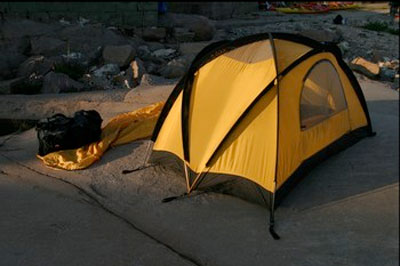(单词翻译:单击)
情景对话
Todd: OK, Terry, now when you take your bike trips, when you bicycle across America or down the West Coast, what is a typical day? Like how would you start your day and how would you finish your day on the bicycle?
托德:泰瑞,你在进行自行车骑行时,骑着自行车穿越美国或沿着西海岸一直向南骑行时,你一天的行程是怎样的?你每天的开始和结束都是怎样的?
Terry: Well, a typical day, I'm camping usually, so I usually get up at or near sunrise, sometimes I get up slightly before sunrise, and I have to pack up all of my camping gear, stuff the sleeping bag in a stuffed sack, roll up my air mattress, pack up the tent, and then eat breakfast and then I usually try and, you know, do the daily essentials and then hit the road. I usually try to be on the road on the road sometime around 7, 7:30 in the morning, depending on when the sun comes up. But I like to go cycling early in the morning because it's cooler and there's, you tend to see more wildlife and I just think it's a nicer time of day, especially if you're riding in the summer, it tends to get warmer, as the day goes on, so, and then I usually try and hit, find a campground sometime in the afternoon and then the process starts again in setting up camp, setting up a tent and whatnot. Um, during the day, I'm usually cycling, actually cycling for 5 to 6 hours a day and then taking two or three hours off, various breaks, and eating lunch and whatnot, and then usually in the afternoon, I stop and buy some food, that I can cook, so I can cook dinner in camp and have breakfast the next morning. Oh, that's pretty cool.
泰瑞:一天的行程,基本上我在自行车旅行时是露营,所以我大概会在日出的时候起床,有时我会在日出前起床,我要收拾露营用品,把睡袋装进包里、把气垫床卷起来、把帐篷收好,然后开始吃早饭,一般我会准备好日常用品好再出发。我会在早上七点或七点半左右出发,这要取决于太阳升起的时间。我喜欢在清晨骑自行车,因为那个时候天气凉爽而且能看到很多野生动物,我认为那是一天中相对美好的时间,尤其是在夏天骑行时,随着时间一天天过去,天气越来越暖和,下午的时候我会找好露营地,然后又是一样的过程,把帐篷支好等诸如此类的事情。嗯……一般我每天骑行五六个小时,然后休息两三个小时,吃午饭或之类的,下午的时候我会停下来买一些食物,这样我就可以在营地做晚饭和第二天的早饭了。这非常酷。
Todd: So you just pay for everything with a credit card, or you bring cash, or?
托德:你买东西是用信用卡还是现金?
Terry: Oh, both. Especially in the Unites States, with debit cards you can get cash back when you're buying food at a grocery store or so. It's always nice to have cash to pay for incidentals and...
泰瑞:哦,都会用到。尤其像在美国,你用借记卡在杂货店之类的地方买食物会返还现金。用现金买一些小东西非常方便。
Todd: Well, that's interesting. You said that you see wildlife. What wildlife would you see?
托德:这很有趣。你说过你看到过野生动物。你看到了什么野生动物?
Terry: Oh, on this trip, as an example: elk and deer and raccoon and possums and turtles and snakes and all kinds of wildlife.
泰瑞:哦,以这次旅行为例:我看到了麋鹿、梅花鹿、浣熊、负鼠、乌龟、蛇等各种野生动物。
Todd: You know, have you almost ever hit an animal?
托德:你有没有撞到过动物?
Terry: I haven't. I don't think I've ever come close to hitting an animal, no.
泰瑞:没有。我想我离它们的距离不足以撞到它们。
Todd: Well, speaking of being hit, have you had any close calls with cars?
托德:说到被撞,你有没有差点被汽车撞到的经历?
Terry: Um, well, that's kind of, I think goes with the territory, so to speak. I've never come close to getting hit but I certainly feel like on occasion, I've been, I've had vehicles come closer to me that I wanted them to close, and, kind of, the real bug-a-boo for cyclists is logging trucks, and back east, coal trucks, they're just, they can be really terrifying when they are going by and you're cycling down the road.
泰瑞:嗯,我觉得可以这么说,这是难免的。我会和汽车保持距离,从来没有被撞过,不过有时我喜欢汽车离我近些,我想让它们近一些,对骑车族来说真正的威胁是木材车和煤车,在骑行时要是这些车经过你旁边会非常可怕。
Todd: I bet. Wow. OK, thanks Terry.
托德:我相信。哇,好的,谢谢你,泰瑞。

译文属可可原创,仅供学习交流使用,未经许可请勿转载
重点讲解
重点讲解:
1. pack up
打点(行装);
eg. He packed up and was ready to go.
他整理好行装准备出发。
eg. I'll have to pack up as quickly as possible.
我要尽快地打点行装。
2. roll up
卷;绕;使成筒状(或球状);
eg. Stein rolled up the paper bag with the money inside.
斯坦把装了钱的纸袋卷了起来。
eg. We will need to roll up the carpet.
我们得把地毯卷起来。
3. hit the road
出发;动身;
eg. I was relieved to get back in the car and hit the road again.
回到车里重新上路后,我松了一口气。
eg. Let hit the road, or we will be late the show.
让我们出发吧,不然看演出就晚了
4. and whatnot
这一类的东西;诸如此类的东西;
eg. The women were there in their jeans and T-shirts and overalls and whatnot.
女人们穿着牛仔裤、T恤、工装裤等等这类衣服在那个地方。
eg. I like to read books on different topics - medicine, energy, arts and whatnot.
我喜欢看各种不同科目的书,像医学、能源、艺术等等。
5. speaking of
(接过话头引入新话题)说到…,谈到…;
eg. Speaking of playing the piano, I am all thumbs.
说起弹钢琴,我真是笨手笨脚的。
eg. Speaking of tennis, Daniel is the best.
说起网球,丹尼尔才是最棒的。
6. close call
勉强脱险;幸免于难;
eg. Joe had a close call when his motorbike nearly collided with a lorry.
乔的摩托车差点同卡车相撞,他侥幸地躲过了。
eg. The bus almost ran him over. It was a close call.
那辆汽车差点把他碾死,真可谓死里逃生。
7. so to speak
可以说;可谓;
eg. I ought not to tell you but I will, since you're in the family, so to speak.
我本来不该告诉你的,但我还是要这么做,因为好歹你是家里的一员。
eg. The five countries have now all passed, so to speak, their entry test.
可以说,这5个国家现在都已经通过了入门考试。
8. on occasion
偶尔;间或;有时;
eg. He treated them seriously and, on occasion, entertained them hilariously.
他对待他们严肃认真,偶尔又逗得他们捧腹不已。
eg. He has been known on occasion to lose his temper.
大家都知道他有时会发脾气。


